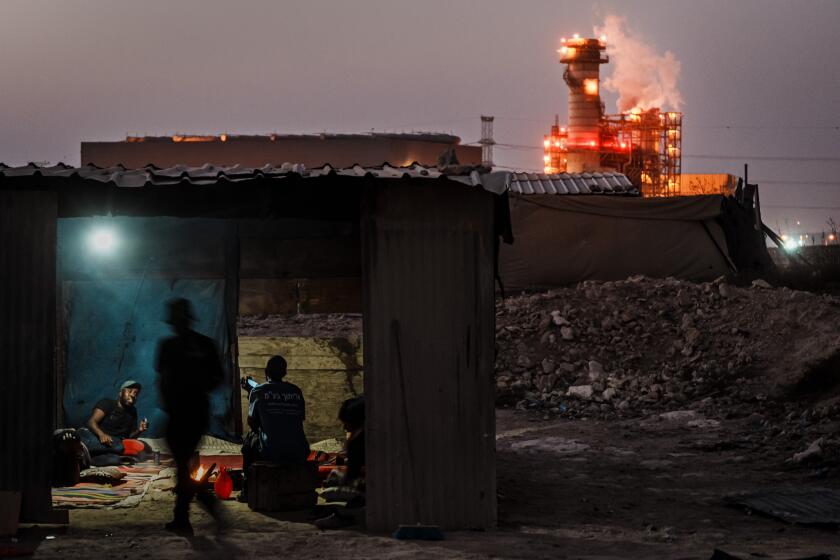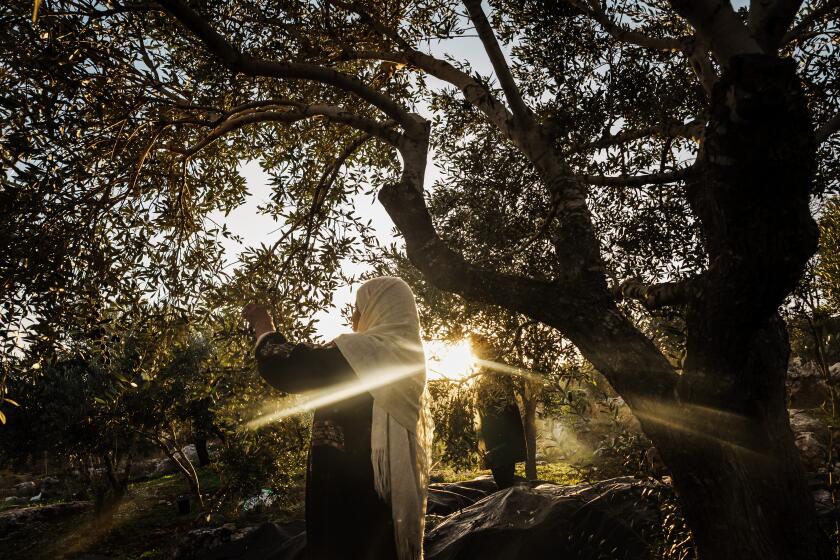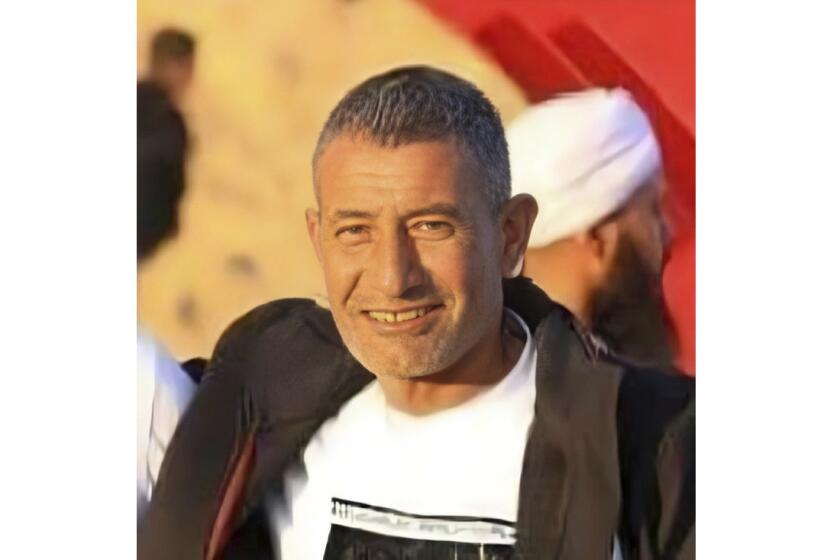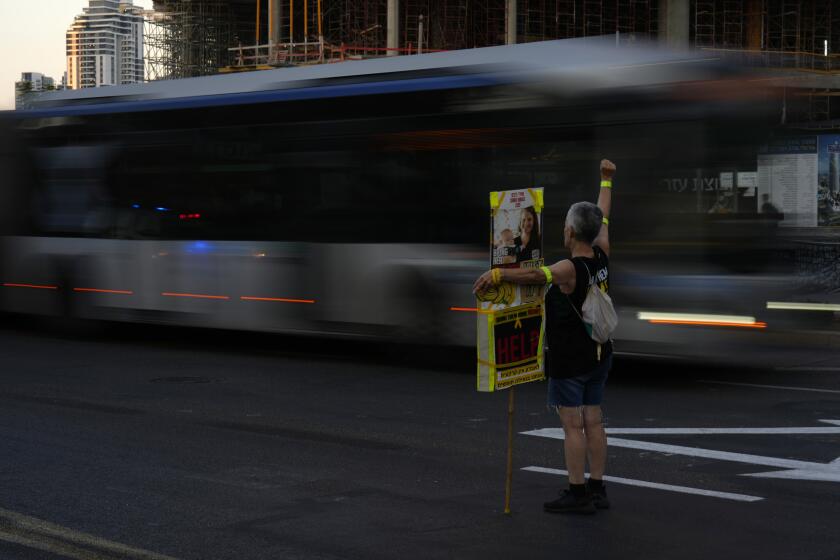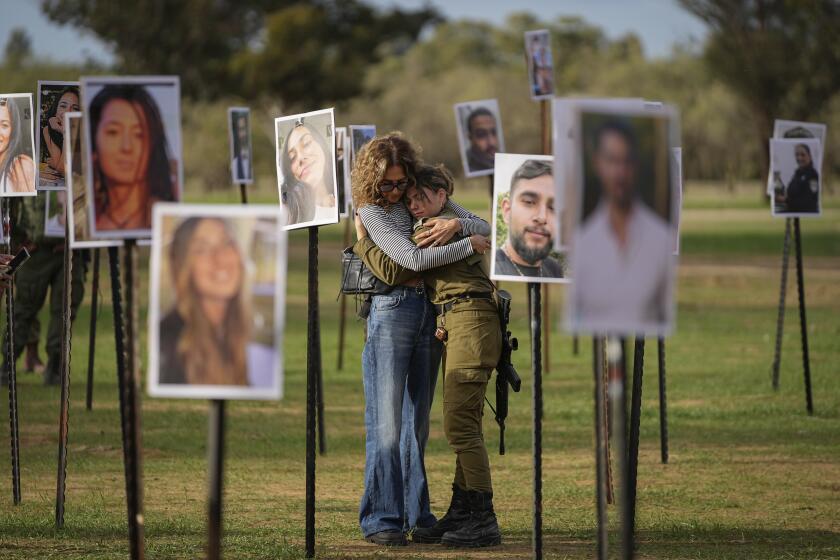Arab Israeli freed from Gaza returns to his Bedouin village, which is targeted for demolition

KHIRBET KARKUR, Israel â An Israeli hostage rescued from Gaza returned to a heroâs welcome tinged with a bitter reality: Much of the small village he calls home, Khirbet Karkur, is targeted for demolition.
Qaid Farhad Alkadi, 52, is one of Israelâs roughly 300,000 Bedouin Arabs, a poor and traditionally nomadic minority that has a complicated relationship with the government and often faces discrimination. While they are Israeli citizens and some serve in the army, about a third of Bedouins, including Alkadi, live in villages the government considers illegal and wants to tear down.
Since November, about 70% of Khirbet Karkur residents have been told the government plans to raze their homes because they were built without permits in a âprotected forestâ not zoned for housing, according to a lawyer representing them. Alkadiâs family hasnât received a notice, but the displacement of this close-knit community has cast a pall on what has otherwise been a joyous 24 hours.
âItâs so exciting; we didnât know if heâll come back alive or not,â said Muhammad Abu Tailakh, the head of Khirbet Karkurâs local council and a public health lecturer at Ben Gurion University in nearby Beersheba. âBut the good news is also a bit complicated, because of everything thatâs going on.â
Bedouins of the Negev desert face rockets from Gaza and discrimination and arrest by Israel. They seek safety as the war energizes the far right.
Alkadi was greeted by dozens of well-wishers Wednesday â and a crush of media. He was released from the hospital and returned home a day after his dramatic rescue, which he recounted in phone calls with Israelâs prime minister and president.
Neighbors and family erected a huge tent in his honor, and served tea and coffee from the early morning as they eagerly awaited his arrival. When the clean-shaven but gaunt Alkadi arrived â seeming overwhelmed by the attention after 326 days in captivity â he spoke with reporters and pleaded with Israeli leaders to free all the hostages.
âIt does not matter if they are Arab or Jewish, all have a family waiting for them,â said Alkadi, a father of 11 who was kidnapped by Hamas on Oct. 7 while working as a security guard at a packing plant near the Gaza border.
âThey also want to feel the joy,â he said. âI hope, I pray an end to this.â
As Israeli settlers use the war in Gaza as a pretext for a land grab in Palestiniansâ other territory, olive farmers fear their way of life may be on the verge of extinction.
Alkadi was one of eight Bedouins abducted on Oct. 7, and three are believed to still be alive in captivity; two teens were released, one was accidentally killed by the Israeli army, and one declared dead is still in Gaza.
On Oct. 7, many Bedouins rushed to help attendees of an Israeli music festival, saving hundreds of lives at a time when the army and police were in disarray.
A spokesperson for the Israel Land Authority said that âin light of the situationâ it would not serve a demolition notice to the Alkadi family. But it would not comment on the plight of his neighbors or their lawyersâ efforts.
On Wednesday, most family members and neighbors tried to focus on the good news, rather than legal fights that could last years.
âWe need that this problem be resolved so that people here ... receive an appropriate solution that fits the needs of the Bedouins,â said Nasser Amran, 59, a friend of Alkadi. âThere is no electricity. For water, they bring a pipe from some community, and it arrives here, but it is still difficult to live in a village without water and electricity the way it should be.â
The Israeli military says it has rescued one of the scores of hostages abducted in Hamasâ Oct. 7 attack, which ignited the ongoing war in Gaza.
Unrecognized villages are not connected to state water, sewage, or electricity infrastructure, and the roads to many are dusty and potholed. Khirbet Karkur is nestled in the shadow of a large dump, and the smell of rotting garbage drifts over the squat corrugated metal homes. Piles of construction debris and trash ring the small cluster of dwellings.
Israelâs Supreme Court has previously deemed many of the unrecognized Bedouin villages illegal, and the government has said they are trying to bring order to a lawless area and give a better quality of life to the impoverished minority.
For decades, Israel has been trying to convince scattered, off-the-grid Bedouin villagers that it is in their interest to move into government-designated Bedouin townships, where the government can provide them with water, electricity and schools. Bedouin leaders have rejected many proposals, saying they would destroy their lifestyle or send them to less desirable areas.
There have been 2,007 Bedouin homes demolished in the first six months of 2024, a 51% increase over the same period in 2022, according to the Negev Coexistence Forum for Civil Equality, which tracks demolitions in the Bedouin community.
The Israeli military says it recovered the bodies of six hostages from Gaza. Israeli airstrike kills at least 12 people at a school-turned-shelter.
The increase in demolitions has coincided with the ascendance of Prime Minister Benjamin Netanyahuâs right-wing coalition. National Security Minister Itamar Ben-Gvir and other members of his party have consistently championed the demolition of illegal Bedouin construction in the Negev desert and Israeli-occupied West Bank.
Ben-Gvir last year traveled to witness a demolition himself, expressing âkudosâ and calling the destruction âsacred work.â
Abu Tailkha says he and his neighbors want to maintain their rural lifestyle, and the government should officially recognize their villages. He said residents of Khirbet Karkur, who were placed there in the 1950s by the government, would be open to moving to another rural area, but not a city.
The government wants to move them north to Rahat, an urban Bedouin settlement of about 70,000, according to Netta Amar Shiff, a lawyer representing families who received demolition notices. She called it âdisgusting cynicismâ for the government to say it will not serve Alkadiâs family with lawsuits.
âIf thereâs a good reason for one person not to get the notice, thereâs a good reason for everyone,â she said.
As the Palestinian militant group Hamas frees more hostages amid a temporary truce with Israel, a harrowing glimpse of captivity in war-torn Gaza emerges.
Regavim, a right-wing group that studies land issues in Israel and supports the governmentâs relocation plan for Bedouins, said the Bedouin are being offered an excellent deal with free land, and it is in their interest to move in order to receive services that every Israeli citizen is entitled to receive.
âIsrael canât provide services to people who just build wherever they want,â said Naomi Kahn, the head of Regavimâs international division.
The unrecognized villages do not have adequate bomb shelters or a warning system in the case of incoming rockets, and at least 11 Bedouin have been killed by rockets fired into Israel since the war began.
âThe entire country is in a war, and I also have to fight this demolition order,â said Abu Tailkha, the head of Khirbet Karkurâs local council.
Abu Tailkha said that while the country and its leaders were embracing Alkadiâs return, he isnât optimistic real change will occur in their village.
âI think in a bit they will forget about Farhad, and they will send another round of demolition orders,â he said.
Lidman writes for the Associated Press.
More to Read
Sign up for Essential California
The most important California stories and recommendations in your inbox every morning.
You may occasionally receive promotional content from the Los Angeles Times.
